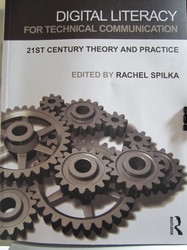But, I refuse to give into those feelings. I knew when I thought of this project that it would be a HUGE challenge. The thing about me is that I LOVE a good challenge. So, as I said in the last post, I had hoped to read the introductions to all of the books that I listed and post on them. Even though this is proving much more difficult right now than I expected, I am still moving forward. One step at a time, right. So, the first intro has been read and here are my thoughts.
I read the foreword, preface, and introduction to Digital Literacy For Technical Communication: 21st Century Theory and Practice Edited by Rachel Spilka. I'll start with a comment on the Foreword by JoAnn T. Hackos. She discusses the fact that she recently purchased a Kindle for reading, especially autobiographies. Apparently, some of her friends can't believe she has "abandoned . . . real book[s] . . . ." She then goes on to say "Does using an intrusive technology somehow degrade the experience of immersing oneself in a text?" (vii). I wrote in the margin, "Intrusive technology, really?" Can someone explain to me exactly what an intrusive technology is? Using a Kindle or an iPhone or a Nook somehow intrudes on the reading experience? It seems to me like a book is more intrusive than these techno gadgets because its more cumbersome and hard to handle. Seems to me like a copy of Stephen King's Under the Dome would be much more intrusive than reading it on a Kindle. But perhaps I'm more of a digital native (even though I'm not) than most. As Hackos points out concerning information-development management, "They are suspicious of innovations that might lead to the demise of their departments" (ix). I think this could be true of so much of the fear that exists at any level and in any department. Will all of these innovations do away with life as we know it, or more importantly, our jobs.
So, that was just the foreword. I'll skip ahead to the introduction now. I guess what intrigued me the most was Spilka's decision to approach this volume not from an angle of "adapt or die", a survivalist mentality, but rather from an "evolution" perspective. Everything evolves: some things faster than others. She also discusses how technical communication has had a tendency in the past to isolate themselves in the past and that now is the time to blur the boundaries and work in teams and with other fields.
It appears that the collection will look at three main areas: Transformation of the field, New foundational knowledge, and New directions. I think the first section will give the reader some history and background, but the third section is the most interesting to me. Some of the quotes are intriguing for me. One such remark is that Thatcher (one of the contributors) states that "digital media simply do not fit all communicative and cultural traditions the same way" (15). Given some of the comments I heard today from grad students at MSU, I think this is extremely important. Digital media do not fit ALL cultural traditions, but I would venture to leave it at that. I don't know that digital media can find a place in ALL cultural traditions period. I look forward to reading that chapter.
Based on the introduction to this text, I do not believe I will begin my project with this particular book. Not because it doesn't sound interesting, but because I'm not sure it fits with what I want to be doing right now. Not that I particularly know what that is, but I know it's not technical communication. At least not right now.
I still can't get over the concept of intrusive technology.

 RSS Feed
RSS Feed

